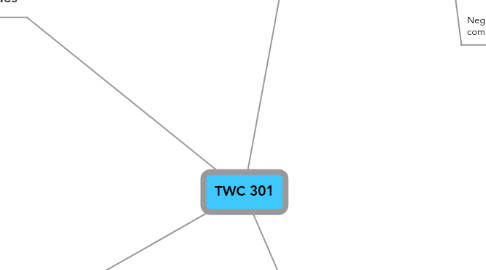
1. Outcomes
1.1. Rhetorical Knowledge
1.1.1. Identify, articulate, and focus on a defined purpose
1.1.2. Respond to the need of the appropriate audience
1.1.3. Respond appropriately to different rhetorical situations
1.1.4. Use conventions of format and structure appropriate to the rhetorical situation
1.1.5. Adopt appropriate voice, tone, and level of formality
1.1.6. Understand how each genre helps to shape writing and how readers respond to it
1.1.7. Write in multiple genres
1.1.8. Understand the role of a variety of technologies/media in accessing, retrieving, managing, and communicating information
1.1.9. Use appropriate technologies to organize, present, and communicate information to address a range of audiences, purposes, and genres
1.2. Critical Thinking, Reading, and Writing
1.2.1. Use information, writing, and reading for inquiry, learning, thinking, and communicating
1.2.2. Integrate previously held beliefs, assumptions, and knowledge with new information and the ideas of others to accomplish a specific purpose within a context
1.3. Processes
1.3.1. Be aware that it usually takes multiple drafts to create and complete a successful text
1.3.2. Develop flexible strategies for generating, revising, editing, and proof-reading
1.3.3. Understand the collaborative and social aspects of research and writing processes
1.3.4. Use appropriate technologies to manage data and information collected or generated for future use
1.4. Knowledge of Conventions
1.4.1. Learn common formats for different genres
1.4.2. Develop knowledge of genre conventions ranging from structure and paragraphing to tone and mechanics
1.4.3. Understand and apply legal and ethical uses of information and technology including copyright and intellectual property
2. Professional Goals
2.1. After course is completed, turn blog into socially active blog concerning Tulsa in particular and Oklahoma in general. Make impressive for future employers.
2.2. Utilize tools covered in the class to organize local information and issues
2.3. Use issue research to find potential internships in addition to Day Center work to further expand resume. Post relevant Day Center and internship/volunteer positions on blog, make relevant links available for potential employers
2.4. Keep in mind potential social projects that networking could benefit. Possibly involve neighborhood members or Ravelry forum in issues/causes. Potentially incorporate networking tools from class into these projects.
3. Virtual Cultures
3.1. Political Activism (early internet theories by Rheingold et al: Internet communities as a method for organizing political change.
3.1.1. Greater potential to educate and organize a larger amount of people on issues. Also, less influence of censorship, but a greater risk of misinformation.
3.1.2. Assumes this will lead to greater action rather than over-information leading to increased apathy and desensitization.
3.2. Positive online community perceptions
3.2.1. Community based on knowledge and contribution as currencies rather than social class
3.2.1.1. Great amounts of information can be shared based on experience as well as education and communally organized.
3.2.1.2. Misrepresentation of self or phenomenon of "armchair doctorates" can lead to misinformation.
3.2.2. Communities can provide feedback similar to offline relationships without social barriers to race or class.
3.2.2.1. This is usually only effective in small online communities.
3.2.2.2. Race barriers may still exist when people struggle to hide their race for acceptance when participating.
3.2.2.3. Physical status may still be effectively concealed. People who feel awkward socially due to weight or physical impairment and deformities can socialize without judgment or pity.
3.3. Negative online community perceptions
3.3.1. Frequent changing of persona
3.3.1.1. It is often possible to present differing persona in offline socialization, short of altering physical appearance. Those who misrepresent themselves online may tend to do so offline anyway.
3.3.1.2. People with poor social skills who experiment with differing persona may actually learn more about what is or is not acceptable behavior.
3.3.1.3. The greater ability to misrepresent one's persona online often leads to mistrust in virtual communities that can hinder community development.
3.3.2. Dangerous subcultures and special interest groups may use the internet to organize.
3.3.2.1. Knowledge of these interest groups by governing agencies and subsequent monitoring may lead to greater arrests.
3.3.3. Interactions online are not as adequate and may lead to isolation and depression
3.3.3.1. This may be true in individuals who already suffer from issues socially; individuals who are more socially adapted are likely to unplug and socialize offline if negative experiences occur.
3.3.4. The Digital Divide
3.3.4.1. Probably not as much of an issue as the underlying causes of poverty itself. Improvement in local economy will lessen this divide, as will programs such as ones providing rural African schools with computers.
4. Copywrong: What branches on the outcomes could be affected by copyright issues? Potentially all of them.
4.1. Rhetoric
4.1.1. Needs of the audience and format presented may have use for works by other people. Change of intention from entertainment to information may assist this from becoming a legal blowout.
4.2. Critical Thinking
4.2.1. Protected materials may be reviewed for critique, or to reframe media in a social context (such as making commentary on the social roles present in novels or movies).
4.3. Processes
4.3.1. Time limit and length guidelines in place may help provide legal protection.
4.4. Conventions
4.4.1. Researching the particular potential infringements or freedoms involved and case studies could prevent legal issues.
